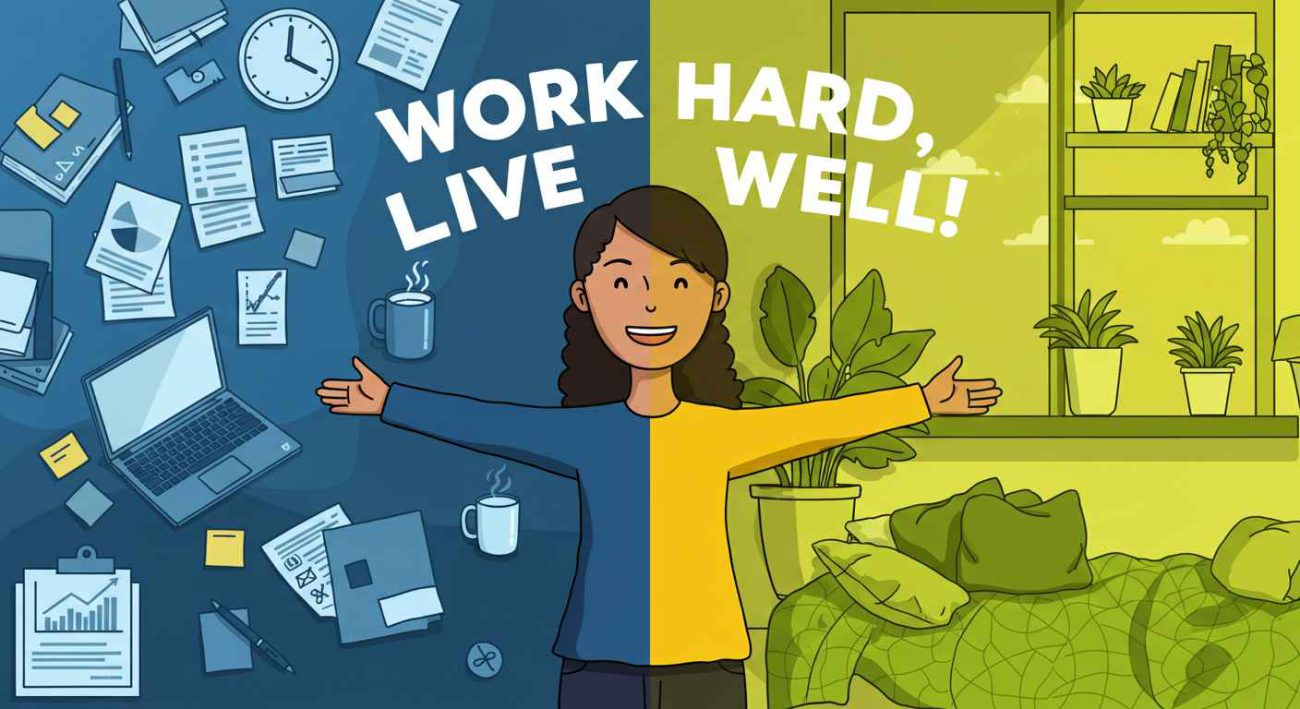You’re juggling emails at 10 p.m., your phone buzzing with notifications while dinner grows cold on the table. Sound familiar? In a world that glorifies hustle, finding equilibrium between work and personal life feels like chasing a mirage. Yet, work-life balance isn’t just a trendy buzzword—it’s the foundation of a healthier, happier, and more productive you. Why does it matter? Because without it, burnout creeps in, relationships strain, and joy slips through the cracks. This article explores why work-life balance is essential and offers practical, actionable ways to make it a reality. Ready to reclaim your time and energy? Let’s dive in.
Why Work-Life Balance Is Non-Negotiable
Work-life balance isn’t about splitting your day into perfect halves; it’s about creating space for both ambition and rest. Studies, like one from the World Health Organization, estimate that overwork contributes to 745,000 deaths annually from heart disease and stroke. That’s a stark reminder: neglecting balance impacts more than your mood—it affects your health. On the flip side, balance boosts mental clarity, strengthens relationships, and even enhances job performance. Imagine approaching your work with fresh energy instead of dragging yourself through the day. Prioritizing balance means prioritizing your well-being. So, how do you start?
Set Boundaries That Stick
Ever feel like work follows you home like an uninvited guest? Clear boundaries are your first step to keeping it in check. Start by defining “work hours” and sticking to them. For example, commit to shutting off work notifications after 6 p.m. Communicate these limits to colleagues respectfully—try a polite auto-reply for late-night emails. At home, create physical separation: designate a workspace and “leave” it at the end of the day. These small acts reclaim your personal time, giving you space to unwind or connect with loved ones. What boundaries could you set today to protect your evenings?
Prioritize What Truly Matters
Balance doesn’t mean doing everything—it means focusing on what counts. Take a moment to list your top priorities: family, health, career goals, or maybe a hobby that lights you up. Now, compare that to how you spend your time. Are you saying “yes” to tasks that drain you? Practice the art of saying “no” to low-value commitments. For instance, if a meeting isn’t essential, suggest an email update instead. By aligning your time with your values, you’ll feel more in control and less like you’re running on a hamster wheel. What’s one thing you could say “no” to this week?
Embrace Time Management Tools
Time is like water—it slips away unless you contain it. Tools like time-blocking or apps such as Trello and Notion can help you organize tasks efficiently. Try this: block 90-minute chunks for focused work, followed by short breaks to recharge. Schedule personal time, too—whether it’s a walk, a coffee date, or reading. A 2021 study from the University of Reading found that structured breaks improve focus and reduce stress. Think of time management as a map: it guides you through your day without letting work overflow into life. What’s one tool you’re curious to try?
Make Self-Care a Non-Negotiable
Self-care isn’t just bubble baths—it’s the fuel that keeps you going. Exercise, sleep, and nutrition are the pillars. Even 20 minutes of movement, like a brisk walk, can lower stress hormones, according to Harvard Medical School. Aim for 7–8 hours of sleep to sharpen decision-making and mood. And don’t skip meals—eating balanced snacks keeps energy steady. Try scheduling self-care like a meeting: non-negotiable and on the calendar. When you treat your well-being as a priority, you’re better equipped to handle work and life’s demands. What’s one self-care habit you can commit to daily?
Disconnect to Reconnect
Our devices are both lifelines and leashes. Constant connectivity blurs the line between work and home. Try a digital detox: set “no-screen” hours, especially before bed, to improve sleep quality (research from the National Sleep Foundation backs this). Use that time to reconnect with yourself or others—maybe a chat with a friend or a quiet moment with a book. Disconnecting doesn’t mean disappearing; it means being present where you are. Could you try one screen-free evening this week? You might be surprised at how refreshing it feels.
Leverage Flexibility in Your Work
If your job allows it, flexibility is a game-changer. Hybrid or remote work, now common post-2020, lets you tailor your schedule. A 2023 FlexJobs survey found that 66% of workers feel more productive with flexible hours. Experiment with starting your day earlier or later to match your energy peaks. If you’re in a traditional office, negotiate small adjustments, like a compressed workweek. Flexibility lets you carve out time for personal passions or errands, making life feel less like a tug-of-war. How could a small schedule tweak make your week smoother?
Build a Support System
You don’t have to balance everything alone. Lean on your network—friends, family, or colleagues—for support. Share responsibilities at home, like splitting chores with a partner or outsourcing tasks like grocery delivery. At work, delegate when possible. A 2022 Gallup study found that employees with supportive coworkers report lower stress levels. Even a quick coffee with a friend can recharge you emotionally. Think of your support system as a safety net—it catches you when life gets heavy. Who could you reach out to for a little extra help this month?
Reflect and Adjust Regularly
Balance isn’t a one-time fix; it’s a dance that requires constant tweaking. Set aside time monthly to reflect: Are you feeling energized or drained? Are you spending enough time on what matters? Use a journal or a simple checklist to track your progress. If work’s creeping into your weekends, adjust your boundaries. If self-care’s slipping, recommit to a small habit. Reflection keeps you honest and helps you course-correct before burnout hits. When’s the last time you paused to check in with yourself?
Conclusion: Craft Your Own Balance
Work-life balance looks different for everyone. Some thrive on a structured schedule; others need spontaneity. The beauty of balance is that it’s flexible—you get to shape it to fit your life. The insights here, from setting boundaries to embracing self-care, are tools to help you build a routine that feels sustainable and fulfilling. Start small: pick one idea, like a screen-free hour or a firm end to your workday, and experiment. You’re not aiming for perfection but for progress. So, what’s one step you’ll take today to bring a little more harmony to your life? Your future self will thank you.

